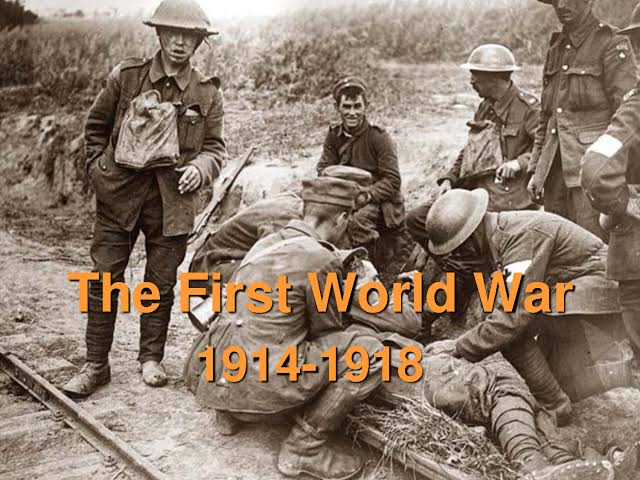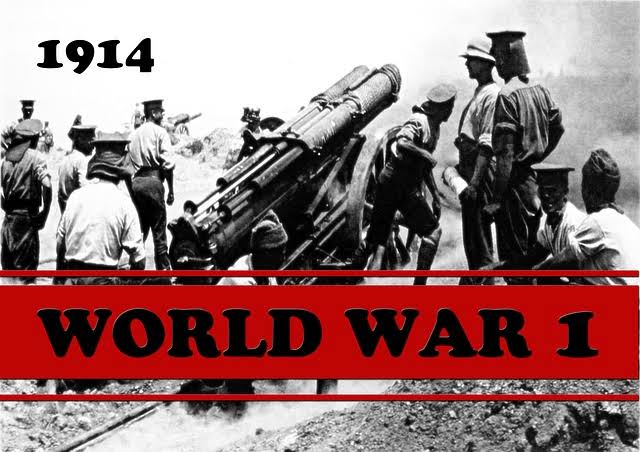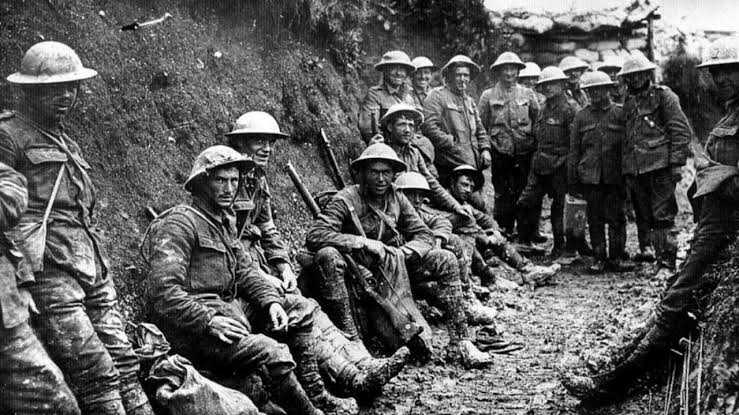When and Why did the First World War happen ? – why did world war 2 start – who
won world war 1
The First World War was a global conflict that lasted from
1914 to 1918, involving major world powers from Europe and beyond. The war had
its origins in a complex web of political, economic, and social factors that
had been building for decades before the outbreak of hostilities. This essay
will explore the causes of the First World War, and the events that led to its
outbreak in 1914.
 |
| When and Why did the First World War happen |
The Causes of the First World War
One of the most significant causes of the First World War
was the complex system of alliances and treaties that had been formed between
European nations in the late nineteenth and early twentieth centuries. These
alliances were intended to provide security and stability, but they had the
unintended consequence of creating an environment in which any small conflict
between two nations could escalate into a major war involving multiple
countries.
Two major alliances had been formed in Europe by the time
the war began. The first was the Triple Alliance, formed in 1882, which
included Germany, Austria-Hungary, and Italy. The second was the Triple
Entente, formed in 1907, which included Britain, France, and Russia. These
alliances were intended to provide a sense of security for the participating nations,
but they also created a climate of suspicion and mistrust between the major
powers.
Another significant cause of the war was the increasing
militarization of European nations in the years leading up to 1914. Many
countries, including Germany, Austria-Hungary, and Russia, had been increasing
their military spending and building up their armies in preparation for a
possible conflict. This arms race only served to heighten tensions between
nations, and made it more likely that a small conflict could escalate into a
larger one.
The assassination of Archduke Franz Ferdinand of
Austria-Hungary on June 28, 1914, was the immediate trigger for the outbreak of
war. Franz Ferdinand was the heir to the throne of Austria-Hungary, and his
assassination by a Serbian nationalist was seen as a direct challenge to the
authority of the Austro-Hungarian Empire. Austria-Hungary declared war on
Serbia in response to the assassination, and soon other nations became
involved, including Germany, Russia, France, and Britain.
The War in Europe
The initial stages of the war were marked by rapid advances
and retreats by both sides, as each army attempted to gain an advantage over
the other. Germany, in particular, made significant advances into France, but
was ultimately stopped at the Battle of the Marne in September 1914. This
marked the beginning of a long period of trench warfare, in which both sides
dug in and fought a brutal and bloody war of attrition.
The war in Europe was fought on multiple fronts, including
the Western Front, the Eastern Front, and the Italian Front. The Western Front,
which stretched from the English Channel to the Swiss border, was the site of
some of the most intense fighting of the war. Both sides dug elaborate trench
systems and engaged in a brutal war of attrition, with little progress being
made by either side.
The Eastern Front, which stretched from the Baltic Sea to
the Black Sea, was marked by a series of rapid advances and retreats by both
the Russian and German armies. The Russian army suffered a number of crushing
defeats, and was ultimately forced to withdraw from the war in 1917 due to the
impact of the Russian Revolution.
The Italian Front was marked by a series of offensives and
counter-offensives, with both sides suffering heavy casualties. The front
eventually became bogged down in a stalemate, with both sides entrenched in a
series of heavily fortified positions.
The War Beyond Europe
While the war in Europe was the primary focus of the
conflict, fighting also took place in other parts of the world. British and
French forces engaged in a long and difficult campaign against Ottoman forces
in the Middle East, while Germany attempted to use its naval forces to disrupt
Allied shipping around the world.
In the Middle East, British and French forces attempted to
gain control of the Ottoman Empire’s territories in the region. The campaign
began with a disastrous attempt to seize the Dardanelles, a strategic waterway
that led to the Black Sea. The campaign ultimately ended in success, with
British forces capturing Jerusalem in 1917 and Baghdad in 1918.
In Africa, German forces attempted to seize British and French
colonies, but were ultimately defeated by Allied forces. German forces in East
Africa, led by General Paul von Lettow-Vorbeck, fought a long and difficult
guerrilla campaign against British forces, but were ultimately forced to
surrender in 1918.
In Asia and the Pacific, Japan declared war on Germany in
1914 and seized several of Germany’s colonies in the region. Australian and New
Zealand forces also played a significant role in the war in the Pacific,
particularly in the capture of German colonies in New Guinea and the Pacific
Islands.
The Impact of the First World War
The First World War had a profound impact on the world, both
in the short term and the long term. The war led to the collapse of several
major empires, including the Ottoman Empire, the Austro-Hungarian Empire, and
the Russian Empire. The war also led to the redrawing of national borders, with
new countries such as Czechoslovakia and Yugoslavia being created in the
aftermath of the war.
The war had a profound impact on the world’s economy, as the
massive amounts of money and resources that were spent on the war had a
significant impact on the global economy. The war also had a profound impact on
the world’s political and social structures, as the war led to significant
changes in the way that governments and societies were organized.
 |
| Who won world war 1 |
The war also had a profound impact on the way that future
conflicts would be fought. The introduction of new technologies such as machine
guns, tanks, and chemical weapons had a significant impact on the way that wars
were fought, and would continue to shape the development of military technology
in the years to come.
Who
won world war 1
The Allied Powers, which included France, the United
Kingdom, Russia, and the United States, among others, were victorious in World
War 1. The Central Powers, which included Germany, Austria-Hungary, and the
Ottoman Empire, among others, were defeated. The war officially ended with the
signing of the Treaty of Versailles on June 28, 1919. The treaty imposed
significant penalties on Germany, including large financial reparations and
territorial losses, and is considered by many to have contributed to the rise
of Nazi Germany and the outbreak of World War II.
Why did world war 2 start
The causes of World War II are complex and multifaceted,
but some key factors include the Treaty of Versailles, the rise of totalitarian
regimes, and the failure of appeasement.
The Treaty of Versailles, which ended World War I,
imposed significant penalties on Germany, including financial reparations,
territorial losses, and limits on Germany’s military capabilities. This created
a sense of resentment and economic hardship in Germany, which was exploited by
the Nazi Party and its leader, Adolf Hitler, to gain support for their rise to
power.
 |
| Why did world war 2 start |
Totalitarian regimes, such as Nazi Germany under Hitler,
Fascist Italy under Mussolini, and Imperial Japan, were also a major factor in
the outbreak of World War II. These regimes sought to expand their power and
influence through aggressive military actions and territorial expansion, which
ultimately led to conflicts with other countries.
Finally, the policy of appeasement, in which European
powers attempted to avoid conflict with aggressive regimes by giving in to their
demands, ultimately proved ineffective in preventing war. This was exemplified
by the Munich Agreement of 1938, in which the British and French governments
allowed Nazi Germany to annex parts of Czechoslovakia in exchange for a promise
of peace, which was ultimately broken.
The immediate trigger for the war was the invasion of
Poland by Nazi Germany on September 1, 1939. This led to declarations of war by
France and the United Kingdom, which had pledged to defend Poland in the event
of an invasion. The war ultimately involved the vast majority of the world’s
nations and lasted from 1939 to 1945, resulting in the deaths of tens of
millions of people and significant changes to the geopolitical landscape of the
world.
Conclusion
In conclusion, the First
World War was a global conflict that was caused by a complex web of political,
economic, and social factors that had been building for decades before the
outbreak of hostilities. The war had a profound impact on the world, leading to
the collapse of empires, the redrawing of national borders, and the beginning
of a new era in global politics and diplomacy. The war also had a profound impact
on the way that future conflicts would be fought, and continues to shape the
way that we think about warfare and conflict today.
Tags
When and Why did the First World War happen – Why Won World War 1 and Why did World War 2 Start, When and Why did the First World War happen – Why Won World War 1 and Why did World War 2 Start



